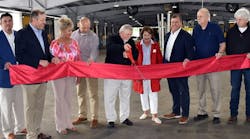The Federal Motor Carrier and Safety Administration's new administrator — expected at presstime to be current Assistant Administrator and Chief Safety Officer John H. Hill — will have his hands full. The agency is reeling from continued legal challenges to hours-of-service and other regulations, criticism from the Inspector General and General Accounting Office, and pending rulemakings such as Electronic On Board Recorders that are certain to be contentious.
Part of the new administrator's job also will be to energize an agency that some staffers describe as “demoralized,” the result of heavy handedness by previous administrator Annette Sandberg, who left unexpectedly this spring. Warren E. Hoemann, Deputy Administrator, also announced his resignation without reason shortly thereafter.
Noting that Sandberg was difficult to work with, several industry stakeholders are holding up hope that a new administrator will be more open to different points of view. “We don't expect everything to be our way,” said one industry official. “We just want a fair and open discussion of the issues.”
Prior to joining FMCSA in 2003, Hill held various leadership positions with the Indiana State Police, including Logistics Division Commander, Commercial Enforcement Division Commander and Field Enforcement Division Commander. He first joined ISP in 1974.
Those who knew him at the state police describe him as “honest” and “solid.”
During his confirmation hearing before the Senate in June, Hill struck a conciliatory note. “A key lesson I learned in Indiana — [which] has resonated even louder since joining FMCSA — is that the goal of commercial vehicle safety depends on careful cooperation and open communication… And the motor carrier industry, safety advocate groups, shippers, commercial vehicle manufacturers, and logistics providers must all collaborate to become joint problem-solvers — not simply critics of each other.”
He added: “If confirmed, I will bring these stakeholders together and encourage cooperation. I will also work with the other surface administrations within the Dept. of Transportation, specifically the Federal Highway Administration and the National Highway Traffic Safety Administration, to build upon Secretary Mineta's unified approach to safety planning initiatives, data improvements, and guidance to the states.”
Working with states will be particularly crucial for the new administrator. The agency has been criticized for poor handling of the CDL program in the wake of continuing licensing scandals. And the Government Accounting Office said that although FMCSA has made great strides in enforcement programs and actions, it was falling short in overseeing joint state-federal safety programs, in part because of reduced headquarters staffing for the Motor Carrier Safety Assistance Program (MCSAP).
DOT's Inspector General also chided FMCSA for failing to apply maximum penalties against 71 carriers that had violated the same safety regulation at least three times during a four-year period because of agency inattention.
“The six-year time frame for accruing violations was delayed by up to four years, and motor carriers who committed violations from September 2000 to March 2004 will essentially be given a clean slate, as violations during this period will not count in identifying a pattern of violations,” the Inspector General stated.
Also at issue is FMCSA's recent spate of regulations and studies that were pummeled by stakeholders. For example, FMCSA issued a five-year, $18-million Large Truck Crash Causation Study that many consider underwhelming and a waste of money. It concluded that car and truck drivers — not weather, roads or equipment — are the cause of most crashes.
To some, this lukewarm conclusion is indicative of FMCSA's lackluster management, or worse, its unwillingness to publish a strong and perhaps more controversial conclusion.
With regulations becoming increasingly complex, stakeholders unafraid to be litigious, and the public demanding accountability, the new administrator must not only be a “people person,” but a strong manager and leader as well.


